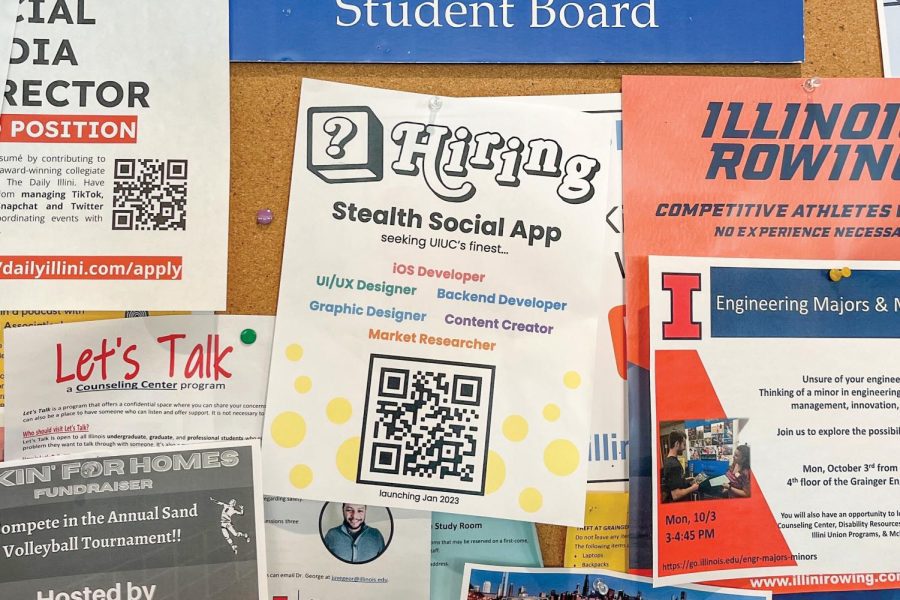UI startup prepares to launch dating app
A flyer “seeking UIUC’s finest” designers and developers for a dating app that is set to launch next semester.
October 5, 2022
Cryptic flyers can be spotted on bulletin boards all over campus that are “seeking UIUC’s finest” for a variety of different positions. Sathwik Reddy and Josh Jay James, the app’s founders, are behind these flyers.
“We are a dating app that will give users a time, place and person to go on a date with,” said Reddy, a recent computer science and economic graduate.
Reddy met James, senior in Gies, through the iVenture Accelerator while working there as a program coordinator. The iVenture Accelerator is funded by the Gies College of Business to support student startups. Together, Reddy and James decided to start their own venture.
“I would consider myself a serial social entrepreneur,” James said. “I love to work on startups, and I’ve been working on them since high school.”
Reddy said the iVenture Accelerator and the University’s student culture, in general, encourages innovation. According to the iVenture website, the program is home to over 50 startups and has worked with over 300 student entrepreneurs.
Get The Daily Illini in your inbox!
Now in their eighth cohort, iVenture is helping entrepreneurs on a variety of different projects. iVenture’s current portfolio includes ASL Aspire, which aims to improve STEM education for students in the deaf community, and Digiphy, a startup that allows users to buy NFTs without a crypto wallet.
“(The iVenture Accelerator) creates an ecosystem for people to build and create an inclusive culture of change makers,” Reddy said.
The app—the name of which the developers refer to as “super secret”—is set to soft launch around Thanksgiving and officially debut next semester.
For now, James said they are keeping details under wraps until they are ready to give “a fully-fledged campaign.”
Although the dating app market is saturated with apps that serve different niches — from Tinder, Hinge, Bumble and beyond, Reddy and James said that there exists a clear problem that they aim to solve.
“Right now, just about any dating app is more of a matching app,” Reddy said.
In a 2019 study conducted by researchers from the Norwegian University of Science and Technology using self-reported data from over 250 college students, they found that a larger amount of matches are made than the actual amount of meetups that happen.
The poor conversion rate can be attributed to a few different factors, Reddy said, including misaligned motivations for using the app, poor profile engagement and lack of user experience.
Reddy added that because these matches don’t convert to dates, the app is looking to implement an approach completely different from what anybody’s experienced on dating apps so far.
“It’s not just dating apps — all kinds of apps are actually designed and developed quite unethically … they’re engineered to keep you hooked, ” Reddy said. “We want to see if we can develop a user interface and user experience to get people to go outside (and) do the exact opposite.”
James said the primary goal of dating apps is to keep users online because dating app companies lose money every time someone gets into a relationship.
The majority of all dating apps are owned by the same company — Match Group. Their portfolio includes Match.com, Tinder, Hinge, OkCupid and others.
“They all have the same DNA … so the state of the market (is) ripe for disruption,” James said.
Looking at the bigger picture, James said dating apps hold a lot of influence on society and have negative consequences.
“The paradigm of apps has created (an) addictive business model that has led to the loneliness epidemic,” James said. “This has become a gargantuan issue for our generation.”
He believes the app’s user experience is part of a larger industry-wide trend that prioritizes new values, including a shift toward authentic interaction.
“We believe that we’re heading into this roaring 2020s … of unprecedented growth spurred by these next-gen technologies designed to enhance your real-world experience,” James said.







